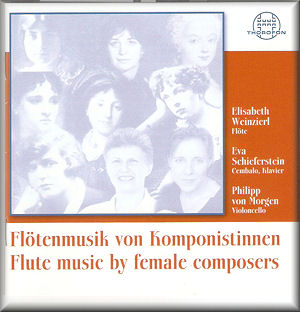 |
 |
|

Availability
CD: JPC.de
|
Flute music by female composers
Anna Amalia von PREUSSEN (1723-1787)
Flute sonata (1756) [9:01] ¹
Anna Bon di VENEZIA (c.1739-c.1767)
Flute Sonata in G Op.1 No.6 (1756) [9:41] ¹
Leopoldine BLAHETKA (1809-1887)
Introduction and variations for flute and piano Op.39 (c.1835) [8:29]
Cécile CHAMINADE (1857-19440
Sérénade aux Étoiles for flute and piano Op.142
(1911) [4:30]
Mélanie BONIS (1858-1937)
Pièce for flute and piano Op.189 [3:38]
Germaine TAILLEFERRE (1892-1984)
Forlane, for flute and piano (1972) [2:22]
Lili BOULANGER (1893-1918)
Nocturne (1911) [2:49]
Barbara HELLER (b. 1936)
Parlando, for flute and piano (1993) [3:37]
Gloria COATES (b.1938)
Phantom for flute and piano (1998 rev 2004) [5:22]
Dorothee EBERHARDT (b.1952)
Träume, for flute and piano (1983 rev 2004) [3:36]
Caroline ANSINK (b.1959)
Epitaph for Marius (2002) [5:13]
Annette SCHLÜNZ (b.1964)
tastend, tränend for flute and piano (2001) [6:04]
Christine K. BRÜCKNER (b.1967)
Tsetono, for flute and piano (2004) [3:06]
 Elisabeth Weinzierl (flute)
Elisabeth Weinzierl (flute)
Eva Schieferstein (piano)
Philipp von Morgen (cello) ¹
rec. January 2010, Petruskirche Munchen-Solln, and December 2010
Bavarian Music Academy Marktoberdorf
 THOROFON CTH2577 [68:11]
THOROFON CTH2577 [68:11] 
|
|
|
I’m sure some will view a selection of music composed
for flute exclusively by women composers as something of a cul-de-sac.
Certainly the baroque-to-contemporary programme wears a comprehensive
cast, as if presenting a female lineage of sorts. But this,
surely, is deceptive. Acknowledging the self-limiting nature
of the works, and not wishing to intrude on the sexual politics
of the disc, I think it’s best to stick to the music.
The senior composer is Anna Amalia von Preussen, the youngest
sister of Frederick the Great - whose prowess on the flute is
well-known and to whom her sonata is dedicated. She was a musician
and collector - her manuscript library was extensive and included
works by Palestrina, Bach and Haydn - and her sonata is predicated
on elegance. It has a courtly refinement, topped by a bright,
engaging finale. Anna Bon di Venezia is rather more obscure.
She was probably born in Venice, moved to Bayreuth, and became
something of a court composer, dedicating her c.1756 Op.1 Flute
sonatas to the Margrave Friedrich, the royal, flute-playing
husband of Wilhelmine of Bayreuth. He was clearly adept at fast
trills because di Venezia tests him with a succession of them,
in her genial and highly pleasing sonata.
One possible reason for pushing the female line in this disc
is the reclamation of court-associated women composers such
as these. A different career however is represented by the piano
wunderkind Leopoldine Blahetka, who was born near Vienna in
1809. Her name is suspiciously Czech-sounding, so maybe she
was part of the Bohemian diaspora. In any case it was on Beethoven’s
recommendation, apparently, that she studied piano with Joseph
Czerny, and later began a career as an admired performer and
later teacher. Her Introduction and variations for flute
and piano was written in the mid 1830s and is very listenable.
She includes an operatic ‘scena’ as well as Rossini-like
badinage and vitality in the faster variations. It’s a
vibrant work, well worth hearing.
From here we enter the twentieth century via Chaminade’s
Sérénade, a confident work, quite well
known these days, and full of charm. Melanie Bonis was another
French composer, and one who was encouraged by Franck and studied
with Debussy. Her Pièce is free-flowing and evocative,
as is the far-more-famous Lili Boulanger’s Nocturne,
which brings with it an increase in the temperature in the Gallic
hothouse. Germaine Tailleferre offers a baroque-slanting Forlane
that moves off to more harmonically questing lines before returning
to its point of origin.
The remainder of the disc is devoted to contemporary composers.
Barbara Heller’s Parlando is spare and well constructed.
Gloria Coates, like everything I’ve heard of hers, tries
too hard in Phantom. The flutter tonguing adds timbre,
as do the jazz elements, but they don’t add up to as much
as the composer wants. Dutch composer Caroline Ansink’s
Epitaph for Marius was written for Marius Flothuis and
is gently elegiac, sectional, contrasting faster and slower
sections. tastend, tränend by Dorothee Eberhardt
is modishly lower-case, very spare, and full of chiaroscuro.
We end with the light, lyric grace of Christine Brückner’s
Tsetono.
This distaff survey will - potentially - irritate for its selection
criteria, but does offer an unusually wide-ranging repertoire,
extremely well played and well recorded.
Jonathan Woolf
|
|















